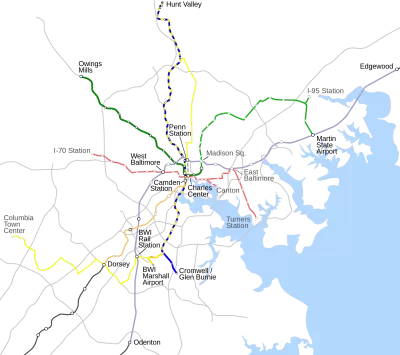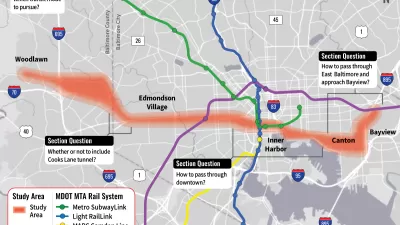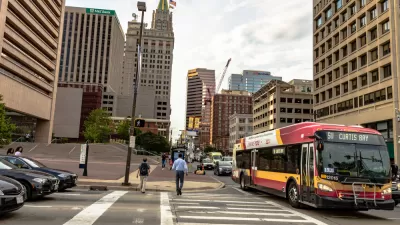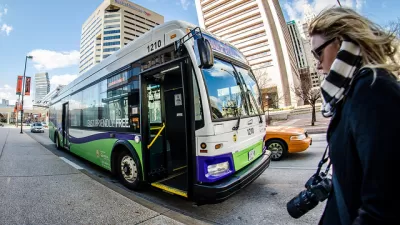The unique structure of the Maryland Transit Administration leaves local stakeholders out of decision-making.

A new report from the Eno Center for Transportation highlights the unique nature of the governance of Baltimore's transit system, the only one of the country's 50 largest state-run transit agencies to operate without a board of directors or local funding. Depending exclusively on federal and state funds, writes Alex Holt in Greater Greater Washington, makes Baltimore "uniquely vulnerable to the whims of each passing Maryland governor."
The report strongly recommends reform, emphasizing the importance of transit governance in determining a system's responsiveness to community needs. Governed by a single administrator, the Maryland Transit Administration (MTA) finds itself at a disadvantage when competing with other state agencies and regions (including the Washington, D.C. metropolitan area) for funding and support. The structure also gives the governor the power to make important decisions about local transit without additional oversight. With transit projects often needing up to a decade to get off the ground, leaving decisions up to governors means many projects get scrapped or forgotten as administrations change.
To remedy the situation, the report presents three possible solutions modeled on Boston, Pittsburgh, and Minneapolis. The suggestions include establishing transit oversight boards, installing a state-level board of directors, and forming a new, more comprehensive transit authority that includes funding and representation from multiple jurisdictions. While some solutions are faster and cheaper than others, the Eno Center report makes clear that the MTA needs drastic reform and more local control in order to effectively serve Baltimore's citizens.
FULL STORY: MTA’s transit governance isn’t working for Baltimore, a new report says

Planetizen Federal Action Tracker
A weekly monitor of how Trump’s orders and actions are impacting planners and planning in America.

San Francisco's School District Spent $105M To Build Affordable Housing for Teachers — And That's Just the Beginning
SFUSD joins a growing list of school districts using their land holdings to address housing affordability challenges faced by their own employees.

The Tiny, Adorable $7,000 Car Turning Japan Onto EVs
The single seat Mibot charges from a regular plug as quickly as an iPad, and is about half the price of an average EV.

Seattle's Plan for Adopting Driverless Cars
Equity, safety, accessibility and affordability are front of mind as the city prepares for robotaxis and other autonomous vehicles.

As Trump Phases Out FEMA, Is It Time to Flee the Floodplains?
With less federal funding available for disaster relief efforts, the need to relocate at-risk communities is more urgent than ever.

With Protected Lanes, 460% More People Commute by Bike
For those needing more ammo, more data proving what we already knew is here.
Urban Design for Planners 1: Software Tools
This six-course series explores essential urban design concepts using open source software and equips planners with the tools they need to participate fully in the urban design process.
Planning for Universal Design
Learn the tools for implementing Universal Design in planning regulations.
Smith Gee Studio
City of Charlotte
City of Camden Redevelopment Agency
City of Astoria
Transportation Research & Education Center (TREC) at Portland State University
US High Speed Rail Association
City of Camden Redevelopment Agency
Municipality of Princeton (NJ)





























